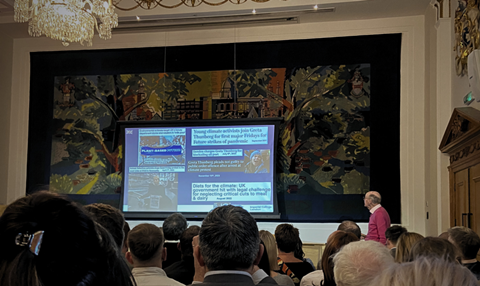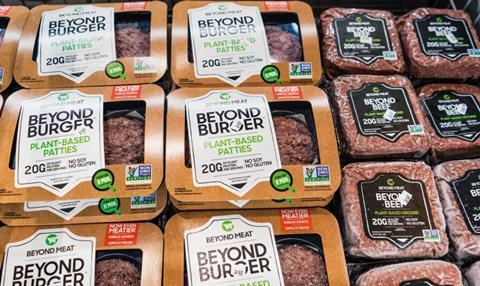As part of his keynote speech at the 2023 City Meat Lecture, Professor David Hughes argued that the meat industry needs to reduce its environmental impact, and effectively communicate its progress in doing so with consumers.

Professor David Hughes is emeritus professor of food marketing at Imperial College London, and visiting professor at the Royal Agricultural University, UK.
The lecture, which was held at Butchers’ Hall in London on Thursday 23rd November, saw Professor Hughes give a presentation on the directions for the British meat industry in the near future, assessing whether the tide is turning on the negative narrative around meat and what the sector can do to accelerate that with positive stories.
How the industry responds to the challenges of climate change was central to Hughes’ argument. Whilst climate change is still seen as a highly political topic in certain parts of the world, according to Hughes, the need to address global warming is strong amongst Europeans and is a consumer demand that businesses can no longer ignore.
Hughes argued that the UK livestock production sector will be transformed throughout the next decade to respond to the challenges made against the industry with regards to its emissions.
"Keeping an eye on the changing demographics of the country, Hughes suggested, is also going to be valuable for the sector going forward; as expanding consumer groups within society will create greater demand for certain meat products."
Upping the ante on progressing initiatives to reduce environmental impact of livestock, production and processing, on animal welfare and on the intrinsic health benefits of red meat, he said, was key to getting a positive message across to the consumer.
For Hughes, the central take-away from the evening’s discussion that was repeated throughout the night was a simple phrase: “Go green or go broke.”
Amongst his reflections on the next 10 years, Hughes also predicts that domestic per capita meat consumption will decrease to reflect the UK’s aging population and increasing flexitarian society. However, as the UK population grows, these numbers will maintain the overall meat market size.
Keeping an eye on the changing demographics of the country, Hughes suggested, is also going to be valuable for the sector going forward; as expanding consumer groups within society will create greater demand for certain meat products.
Hughes also addressed the rise and recent declines experienced by the plant-based sector, arguing that consumers recognised the differences in ingredients between traditional meat and its plant-based counterparts. With cell-based meats, products of this nature are yet to properly arrive in the UK market and establish a presence; but there will be “eye-watering financial losses” involved in doing so, says Hughes.

We need to be more trusting as an industry
Following the lecture, the evening was rounded off with a discussion from a panel of speakers as part of a Q&A session, facilitated by the lecture's chairman Stuart Roberts.
Joining Professor Hughes on the 2023 panel were Katharine Haenelt, UK managing director of the OSI Group, and Harriet Wilson, partnerships director for Meat Businesswomen.
Reflecting on Hughes’ presentation, Haenelt said that she felt more collaborative work could be done by the sector to address the issues raised in the main presentation: “We need to be more trusting as an industry. The meat industry isn’t as good as working together as other industries are and I think that’s a central part of the issue.”
Answering a question on the impact of technology and AI in helping the industry get its message across to consumers, Wilson said that positive messaging has to be central when using new technology to communicate with the consumer. She said that the industry has “a strong story to tell” and that the industry has a responsibility to tell that story efficiently.
The influence of social media platforms such as YouTube and TikTok were also discussed as part of the panel discussion, with panellists agreeing that the next generation of consumers are relying on these platforms for information about food and diet. Meat Management’s sister publication, Food Management Today, spoke to founder of influencer marketing firm Gen Z Talent, Remy Beaumont about this topic earlier this year. The full interview can be found here.
This story was originally published on a previous version of the Meat Management website and so there may be some missing images and formatting issues.












